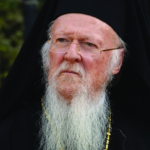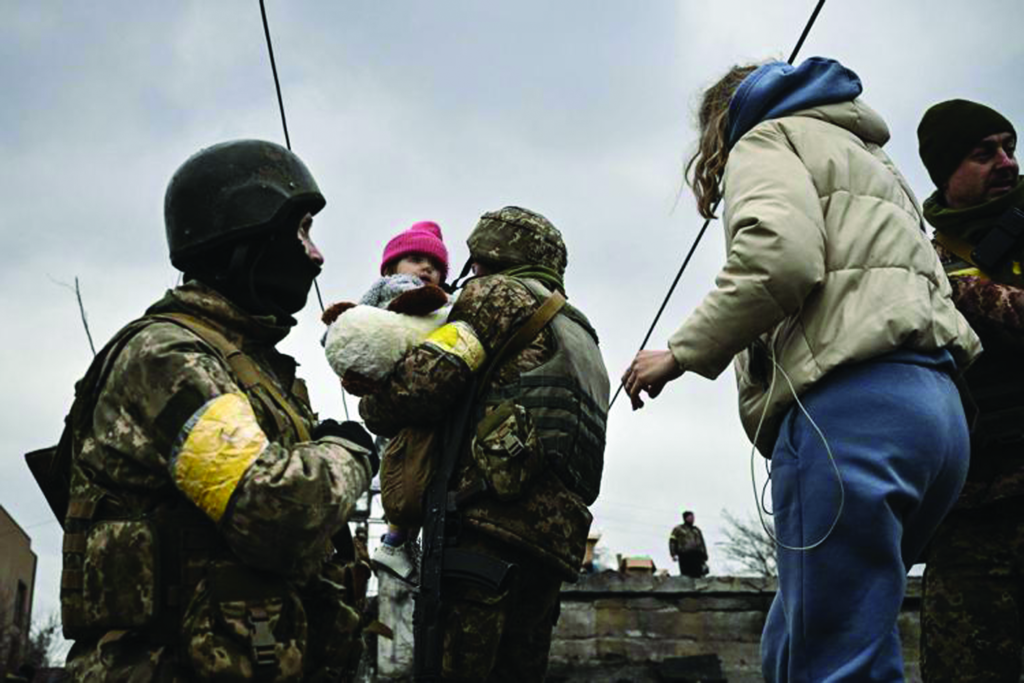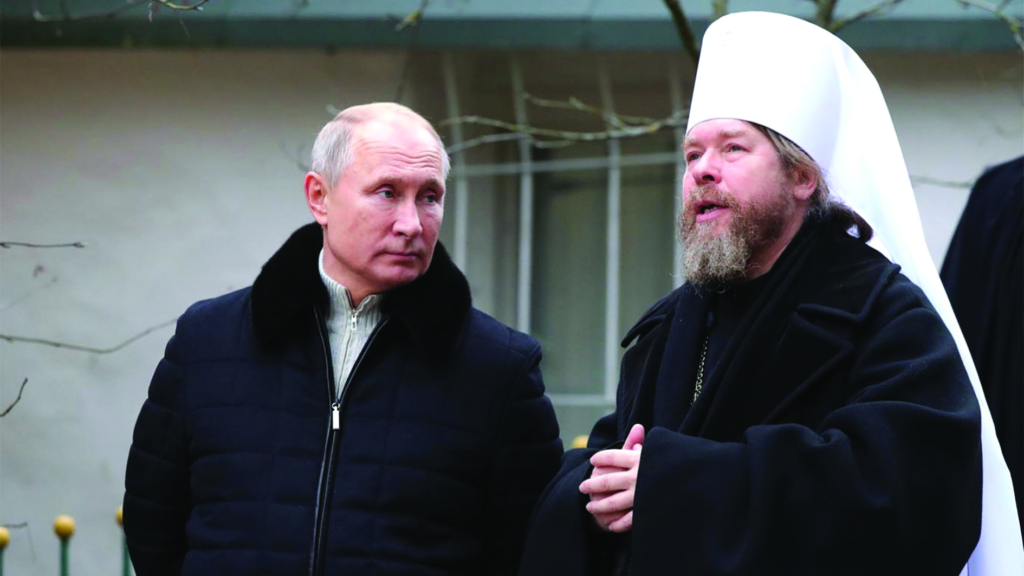By Matthew Trojacek
“Dialogue and Reconciliation are Not Optional for Us”: An Interview With Ecumencial Patriarch Bartholomew

The Ecumenical Patriarch, Bartholomew, spiritual leader of an estimated 250 million Orthodox Christians worldwide
Ecumenical Patriarch Bartholomew I is the spiritual leader of an estimated 300 million Orthodox Christians worldwide. He was chosen in 1991 to lead the Ecumenical Patriarchate of Constantinople. In an interview with The Pillar, conducted via email on October 20 and excerpted here, he spoke about the Ukraine war, the Russian Orthodox Church, and the quest for Christian unity.
Pillar: In a message that Pope Francis sent to you on the feast of Saint Andrew 2020, he expressed his desire for full communion between Catholics and Orthodox Christians. Do you share the Pope’s confidence that full communion is possible?
Patriarch Bartholomew: Unless we share hope and yearning for full communion, then we cannot really say that we are disciples of Christ. Union and communion is a mandate of the Lord Himself, who — on the night he was betrayed — prayed with tears that his disciples may be one (John 17:21). Dialogue and reconciliation are not optional for us; they are directives and commandments.
Pillar: The Russian-Ukraine War is a conflict largely between Eastern Orthodox Christians. How do you feel about this as the spiritual leader of the world’s Eastern Orthodox Christians?
Patriarch Bartholomew: The ongoing war waged by Russia into the sovereign territory of Ukraine has weighed heavily on our mind and heart in recent months. It is true that it has been characterized as Orthodox fratricide, although the consequences have reached many more people, including Ukrainian Catholics as well as other Christian and religious believers, and the repercussions have surely been felt throughout the world.
Pillar: We are witnessing multiple crises in Europe: war, refugees, energy, poverty, and the environment. Where can we find hope?
Patriarch Bartholomew: There is a moment in the Orthodox Divine Liturgy, when the priest turns to the congregation and says: “Let us love one another so that we may confess God with one mind.” The challenges you mention confront not just Europe, but the entire globe. Unless we face them in a spirit of love, we will not prevail.
This is why we have committed to addressing these problems jointly with our brother in Christ, Pope Francis. If our churches are as yet unable to claim full communion, we can at least proclaim our resolve to address the world’s crisis in solidarity of faith and action. (ThePillar)

Ukrainian Catholic Leader Gives Pope Francis Russian Mine Fragment
Major Archbishop Sviatoslav Shevchuk was in Rome the first full week of November to speak with Pope Francis and members of the Roman Curia about the war in Ukraine. It is his first time leaving Ukraine since Russia launched its full-scale invasion on February 24.
During their private meeting November 7, the 52-year-old Schevchuk gave Pope Francis a fragment of a mine that destroyed the front of a Ukrainian Greek Catholic church in the town of Irpin, outside Kyiv, in March.
Irpin was the site of one of the first major battles after the Russian invasion of Ukraine. Ukrainian forces were able to recapture the town on March 28, two weeks after Russian troops had gained control of half the town. (CNA)
Pope Francis Chooses Papal Ambassador to Lead Dicastery for the Eastern Churches
Pope Francis on November 21 appointed a papal ambassador and expert in Eastern languages and literature to lead the Vatican Dicastery for the Eastern Churches.
Archbishop Claudio Gugerotti, 67, has been apostolic nuncio to Great Britain since July 2020.
The Italian was undersecretary of the Dicastery for the Eastern Churches from 1997 to 2001, before beginning his diplomatic service as an apostolic nuncio to Georgia, Armenia, and Azerbaijan in December 2001.
Gugerotti was also apostolic nuncio to Belarus for four years and Ukraine for almost five years before moving to Great Britain. (CNA)
Cardinal Raï Meets Arab Ambassadors in Italy
On November 30, Maronite Patriarch, Cardinal Bechara Boutros Raï, met at the residence of Lebanese Ambassador to Italy Mira Daher with the ambassadors of Saudi Arabia, Qatar, Bahrain, the Emirates, Oman, Kuwait, Jordan, Yemen, Palestine, Sudan, and Iraq, in an acquaintance visit.
Also present were the patriarchal delegate to the Holy See and president of the Maronite Pontifical Institute in Rome, Bishop John Rafik Al-Warsha, and the curator of the Priestly Institute, Joseph Sfeir. The atmosphere of the meeting was described as friendly.
Urbi et Orbi Communications, which publishes this journal, recently sponsored a meeting with Cardinal Raï in Lebanon as part of its “Friends of Lebanon” initiative, which is seeking ways to help and strengthen the Church in Lebanon and bring aid to the suffering Lebanese. (MTV)
Split Fears over Liturgy Row Force Indian Bishops to Talk
The top decision-making body of the Eastern Rite Syro-Malabar Catholic Church has formed a team of three bishops to dialogue with warring priests and the laity of an archdiocese amid threats of them breaking away from the Catholic Church over a protracted liturgical dispute.
The permanent Synod of Bishops of the Church based in southern Indian Kerala state formed a panel November 24, authorized to dissuade the Archdiocese of Ernakulam-Angamaly from exiting the global Catholic Church, and the composition of the panel indicates that a compromise may be possible.
Archbishop Mathew Moolakkatt heads the Knanaya Kottayam diocese which has a separate liturgy and does not even allow inter-denomination marriages, even with other Catholic rites.
But Archbishop Joseph Pamplany of Tellicherry and Bishop Jose Chittooparambil of Rajkot are known liberals who may not be adamant about the adoption of a uniform liturgy.
Cardinal George Alencherry, head of the Syro-Malabar Church, has appealed to all faithful to pray for an amicable settlement and urged the parish priests and heads of religious institutions to organize at least one-hour adoration for the cause.
The Archdiocese of Ernakulam-Angamaly is the largest diocese of the SyroMalabar Church and the second-largest Catholic diocese in India with more than half a million believers. (UCANews)
Metropolitan Tikhon, Close to Putin, Says, “We Need Peace”

Russian Orthodox Metropolitan Tikhon Shevkunov, who has been called Vladimir Putin’s “personal confessor,” in November said “we need peace” in Ukraine
Metropolitan Tikhon Shevkunov, who has been called Vladimir Putin’s “personal confessor” (though this has never been confirmed), made an extraordinary plea, in a November interview with Russian media, for an end to the war in Ukraine after months of bloodshed. “We must speak about what we wake up with, what’s in our heads all day long, and what we go to bed with — it’s Ukraine,” he said. “There is no doubt we are living through an unprecedented tragedy, a fateful stage in the life of our people, our country, and Ukraine. How will it end? We shall pray that, of course, it should end with peace, and safely. Everyone is calling for peace now. We need peace by the will of God, to resolve this issue, battles, hatred between brothers,” Shevkunov said, “even though they don’t want to call us brothers now. But we understand they are brothers, and not long ago they did call us brothers. I am certain people cannot resolve it. How could it be resolved after all that has happened? Only God Almighty can resolve it all, I have no doubt about it.” (Dailymail.co.uk)
Orthodox Patriarch: Valid Synodality can Never Move Away from Tradition
A synodal ecclesial program is fruitful if “it helps everyone to walk in the faith of the Apostles cherished by Tradition.” For this reason, references to synodal dynamics “cannot be used to open fractures among members of the Church on questions of faith or morals.”
Thus Mar Awa III, Patriarch of the Assyrian Church of the East, offered, in an interview released December 5, an oriental perspective for looking at the synodal process started in the Catholic Church.
“The synodal dynamic of the Church consists in walking together in the faith of the apostolic Tradition,” he said. “The synodal modality serves to safeguard and confirm the unity of faith in this path, facilitating it for all and freeing all from useless burdens and ecclesial practices that hinder it.”
“Therefore,” he went on, “the criterion for evaluating the validity and fruitfulness of a synodal process is whether it, in the present time and in the current historical condition, helps everyone to walk in the faith of the Apostles cherished by Tradition.
“The exercise of synodality, if it really is the path of all the baptized and of all bishops as successors of the Apostles, can never be used to move away from the riverbed of the Apostolic Tradition, of the faith transmitted to us by the Apostles, which unites the Catholic Church and the ancient Churches of the East. We share the same Depositum fidei received from the Apostles.” (Agencia Fides)
East and West can Learn from Each Other
The Ukrainian Catholic Church, though a minority in the universal Church, thrives in Canada, where most of the Catholics belong to the Latin rite. Bishop Bryan Bayda of the Ukrainian Catholic Eparchy of Toronto and Eastern Canada told Vatican News in December 2022 that this paints a “wonderful image” since, whatever role the Ukrainian Catholic Church plays, it brings with it “a history” and “a perspective.”
“And truly, if there are two lungs, and East and West, that the Church relies upon to give life to the body of Christ, there are so many other parts of the body — to use St. Paul’s image — that we have to rely on. And, you know, it’s profound. I mean, the brain and the ear and the feet and the fingers, they all need each other,” said Bishop Bayda.
The bishop explained that persecution in Ukraine over the centuries has marked the Church and has “shaped us and has transformed us,” leading to the realization that “it’s about mercy, it’s about being Christ.” He added that if some of that can be brought to the table — to interfaith dialogue, and to interactions with the Roman Church at the level of the Canadian Bishops’ Conference — then the Ukrainian Church in Canada will have lived out synodality. “We can learn from each other that way and we can learn from the West on how to do that, and yet at the same time I think we have some examples that we can give the West, as an Eastern Church in Canada, some hope, some freshness. The Holy Spirit speaks more than one language.” (Vatican News)





Facebook Comments